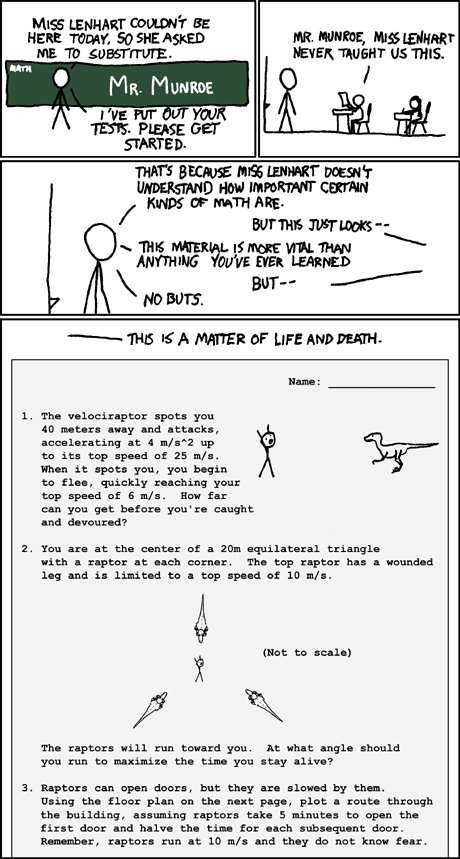One I found recently that gave me cause to chuckle was this:
As a teacher I’m not a huge fan of giving out homework (this is an understatement) - to be honest I’d rather kids go home and spend the same amount of time playing games with their parents. It’s one of those things though - many families expect and want their children to have homework - so despite several years of assiduously avoiding it as best I could I’ve decided to try and slightly different tack to traditional maths and spelling questions. Every week the kids in my room delete from and add questions to a matrix - questions relate to various topics - mathematics, literacy, the Arts, science and our theme (which this term is ‘Australia’).
I’ve been pleasantly surprised by both the questions asked and the answers found. We have had some really complex questions posed - such as ‘Why don’t we fall off the Earth?”, “How was Uluru formed?” and “What is the oldest type of writing?” As well as a range of questions that reach from the inscrutable to the relevant and philosophical. They also cover a satisfying range of topics - not simply mathematics and spelling (though both of those as well)!
I’ve tried to ensure that questions are a mix - some simple; requiring a little research, some more complex. Some asking for pure opinion, some for creative thinking.
example of our homework
Ultimately I don’t expect my grade 3 and 4 students to walk away remembering that the gravitational force generated by our planet’s mass is what attracts us to the surface, or that Uluru was formed by millions of years of sediment build up, or that cuneiform is a form of clay-tablet writing used by the Sumerians.
What I do want though is for students to find out little bits and pieces about things they didn’t know before hand, to have some stake and say in what they research or respond to, to think and read about things outside their normal spheres of experience - things they may never look at in school again. The very act of thinking and asking the questions we put in the matrices is giving them a valuable voice - something they may not have had much experience of before.
Hopefully they walk away with an increased sense of curiosity, with the idea that they can ask questions, and can go looking for the answers. And perhaps most importantly: that learning is not just about being able to spell correctly or find the correct answer to an algorithm (as important as those things are).
So far we all seem to be enjoying it - as much, at least, as homework can be enjoyed. I’d still rather they play games with their parents, but for the time being at least this is interesting - and the responses I've read have been the range of fascinating, well researched, carefully thought out and creative. We shall see how it lasts...
If you have any questions for the class - tweet them to @Pritchard_class with the #homework34P


my favourite XKCD is still on Correlation:
ReplyDeletehttp://xkcd.com/552/
but then we all have our own hot spots :-)
So here's a question for your students. In the context of space how do we know what is Up and what is Down? With that in mind why is Australia "Down Under"?
When did North become 'up' and why?
Ha! I hadn't seen that one. There are a lot of the xkcd comics that I think are quite hilarious.
ReplyDeleteLove the question - will pose it to the kiddies and see how they respond!
Interestingly enough, we give our 3/4 students a very similar Homework Grid each term in Brunswick West. I was wondering if you update yours every week? (Which would be a bit of a hassle and take away from the limited preparation time a teacher has each week.)
ReplyDeleteOur homework grid was devised to complement the Independent Learning thinking skills we encourage in the classroom with Numeracy and Literacy. Each student can choose one the activities to complete well with their parents. And if they finish before the homework is due, they are welcome to begin another activity.
Even with this grid in place and our school agreeing that rote homework helps very little, there are the occasional parents who think we should be handing out reams of paper each week. Funnily enough, these are the parents that openly state that they don't have time to sit down and help their children to learn. They want something to distract the child instead.
The majority of views on this recent Life Matters radio program favours the limited homework approach for primary school students ~ http://www.abc.net.au/radionational/programs/lifematters/homework/3933036
We have a messy Monday morning - Assembly, nothing, library...
ReplyDeleteIn the half hour or so between assembly and Library I do the usual things - roll, lunch orders etc. We also pull the homework matrix up on the Interactive Whiteboard - and the kids suggest new questions to replace old ones (which I'll change as required). We won't always swap every question every week, but I do try and change the simple ones (ie: the ones with a single fact as an answer).
Yes - I'd rather see kids playing a game or something with their parents than doing homework after hours - I worked with one school in Bendigo (St. Liborius PS) helping them set up a Games Library for that purpose (they managed to get a couple of grants to support it).
Thanks for posting the link - I'll check it out!
Cheers,
Giles.